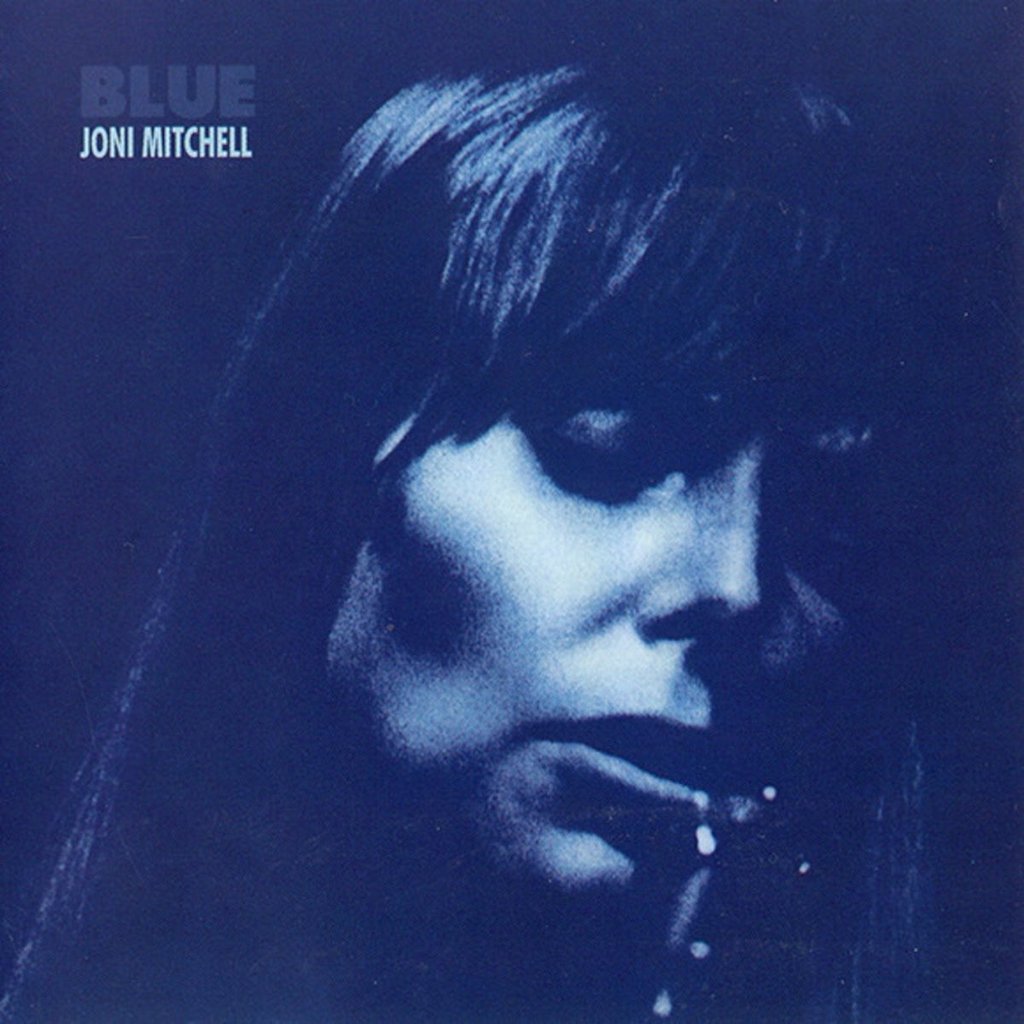
The Last Time I Saw Richard is one of my favourite things. Here’s why.
I was introduced to Joni Mitchell’s 1971 album, Blue, when I was a first year undergraduate at art college. Maybe this is when everyone first hears the album? It certainly reads like a cliché now I’ve written it down.
The person who brought Blue to my attention was an older female student, a formidably assertive ceramicist, who was bisexual long before it was a thing and gave zero fucks what people thought of her. This was back in the early nineties, so my copy was pirated for me on a plain silver disc covered in the big indelible loops of the ceramicist’s hand-writing. I don’t know why this warm, generous, hot-headed woman thought I needed this album. Obviously I was walking about the place with a Joni Mitchell-shaped hole in me, as conspicuous to everyone else as a really bad hat.
Whatever the reason, Blue arrived with me, gifted by someone older and wiser, by someone who lived and worked in London, someone who’d travelled widely, someone less inhibited, someone with more notches on their bedpost, someone trailing more damage, someone bigger, someone braver.
The first thing you notice is how immediate it sounds, as if this is music not reaching you from some recording studio in 1971, but from a more intimate pocket of space.
I like every song on Blue. If it wasn’t June, I’d just as likely be enthusing about River, ‘the greatest, saddest Christmas song of all time’, and if I was tousled and sunburned from lounging too long by the pool, I’d be likely banging on about Carey, ‘the greatest summer holiday song of all time’.
The Last Time I Saw Richard is the final track on the album, the one that leaves you in silence, the one that makes reaching for another song or album feel as unseemly as buying a puppy moments after burying your dog. The song is just three short verses long; two people sitting across from each other in a bar, one of whom, Richard, is chiding the other’s romanticism and predicting for her only disillusionment. Richard’s companion suspects Richard ‘protests too much’, that his heart, though buried beneath bitter experience, lives on no less hopefully, and she points to his choice of songs on the establishment’s jukebox as proof.
The last time I saw Richard was Detroit in ’68
And he told me, “All romantics meet the same fate someday
Cynical and drunk and boring someone in some dark café
“You laugh,” he said, “you think you’re immune
Go look at your eyes, they’re full of moon
You like roses and kisses and pretty men to tell you
All those pretty lies, pretty lies
When you gonna realise they’re only pretty lies?
Only pretty lies, just pretty lies”
He put a quarter in the Wurlitzer, and he pushed
Three buttons and the thing began to whirr
And a bar maid came by in fishnet stockings and a bow tie
And she said “Drink up now, it’s gettin’ on time to close.”
“Richard, you haven’t really changed,” I said, it’s just that
Now you’re romanticizing some pain that’s in your head
You got tombs in your eyes, but the songs you punched are
Dreaming, listen, they sing of love so sweet, love so sweet
When you gonna get yourself back on your feet?
Oh and love can be so sweet, love so sweet
The Last Time I Saw Richard is filmic, which is surely why it springs to life so readily in my mind’s eye. I love the description of the barmaid in her fishnet stockings. I understand everything I need to know about this supporting character; the wilt of her bowtie, the aching of her feet, her impatience with couples and their intense conversations familiar to anyone who has worked behind a bar or waited tables; someone’s life is falling apart and all you’re thinking about is slipping your feet out of your shoes.
The images which accompany this song in the picture palace of my head are pilfered from Edward Hopper, a blending of Nighthawks (1942), Automat (1927), New York Movie (1939) and Night Windows (1928). The era is wrong, but everything else feels right. This affinity is as much to do with the brevity of Hopper’s paintings as it does with their isolated subjects. Mitchell’s three short verses allude to entire lives and complex emotional realities. They find their visual counterpart in the cropped glimpses of Hopper’s compositions; both offer views fleeting as they are meaningful.
After Hopper’s paintings, it’s another room I see, the bedroom of the student house I lived in for the duration of my degree. The house itself was unremarkable, rather awful even, situated in an estate populated by smugglers – not the whiskery Cornish sort, but the sun-burned, bald, brick shithouse kind with fleets of transit vans stacked with stolen fags. As art students, my housemates and I had little in common with our neighbours, except in one regard; like them, we didn’t have a proper job between us either.
The first thing I did after moving into my student house was paint my room’s old granny wallpaper with terracotta emulsion. Terracotta was having a moment, likewise anything with moons and stars on it. There was nothing to be done about the purple carpet in my room, except, Stockholm-syndrome style, grow to love it. Luxury of luxuries, my room had a double-bed, old and soft and a disaster-zone for vertebrae. I had a duvet cover of tiny flowers in shades of custard, biscuit, and the brown-pink of sticky-plasters. My room faced West. On sunny evenings, the terracotta walls blazed (my purple carpet too) and my double-bed would bake. I was conceited enough to think, by letting the plangent chords of The Last Time I Saw Richard escape freely out of my open window into the broiled air of the estate, I was providing a service to the world-at-large. I liked to imagine the song inspiring moments of respite, reflection and fugue, similar to the scene in The Shawshank Redemption when an entire prison is transported by Duettino “Sull’aria”. In reality, these plangent chords were as short-lived as mayflies, swatted from the air by the rich imbroglio of noise from our neighbours’ front gardens, where smugglers sunbathed in deck chairs, drunk as lords and ribald as vikings.
Young people like to think they’ve discovered sex, much to the twinkling amusement of everyone older than them. It must be the same when young people discover Joni Mitchell, but in my defence, there’s something more subtle to express here; sometimes you arrive at something you understand in your sinews, not because your own experience aligns with it. It shouldn’t be possible to feel pangs of nostalgia for an experience who’ve never had, and I was hardly built in the image of the characters populating Joni’s songs; I wasn’t shot through with all that super-8 sunlight. I wasn’t a restless traveller, beach-comber, spontaneous road-trip taker, or world-weary disillusioned lover. In no one’s imagination was I a carefree soul, and yet, I found Blue‘s songs recognisable, none more so than The Last Time I Saw Richard.
Richard got married to a figure skater
And he bought her a dishwasher and a Coffee percolator
And he drinks at home now most nights with the TV on
And all the house lights left up bright
I’m gonna blow this damn candle out
I don’t want Nobody comin’ over to my table
I got nothing to talk to anybody about
All good dreamers pass this way some day
Hidin’ behind bottles in dark cafes
Dark cafes, only a dark cocoon
Before I get my gorgeous wings and fly away
Only a phase, these dark cafe days
A rare phonecall between my father and I takes place in the grim, dim hallway of that same student house with the flaming terracotta room upstairs. I’m lonely and dissatisfied in ways not completely visible to me. I’m not sure I’m on the right degree course. I’m not sure I’m on the right path. I’m not sure I’m living the life I want to. I’m not sure of very much it seems. Dad tells me to buck-up. Dad, a hard-working self-made type, shrinks the vagaries of my formless existential angst by reminding me that happiness is the quest for ‘a bigger sofa, a bigger car, and a bigger house’. I need to wake up, move on, get real, grow up. This is the last time I solicit his advice – just in case he’s right.
I think about this telephone call when I hear The Last Time I Saw Richard. The song returns me to the white-hot frustration I felt at the fatalism of my dad’s counsel. I transpose our telephone conversation to a Hopperesque bar, with my father and I sitting on opposite sides of a table; he tells me I’ll soon learn what he’s learnt and that it’s time to put away childish things. I remind him of the paintings of his I’ve seen from when he was a young man – the dinosaurs, and the Biro bats on his old satchel.
A few years later, I go to a barbecue hosted by one of my friends from art college. I’m as poor as a church mouse and can’t really afford to be socialising, but there will be other people from college at the barbecue and I’m looking forward to seeing them again. It’s fun for a short time, and then I’m holding a piss-poor excuse for a hamburger listening to multiple conversations about London house prices.
On the train journey home, I stare out at the houses neighbouring the railway line. The Last Time I Saw Richard plays in my head. It’s because I’m thinking about Edward Hopper, and all the big/little stories going on inside these houses. More specifically, it is the lines about Richard’s coffee percolator and his house with ‘all the lights left up bright’ going round and round. We’re all Richard now, I decide miserably, thinking back to the barbecue and its utter banality. I cast glances around the carriage at all the hollowed-out men and women staring out of windows. Now I’m thinking about the final lines of the final verse, as the song’s narrator doubles-down on her refusal to go this same way, even as the chords, the vocal performance, and the shape of the song lead us to suspect it’s already too late, that she is Richard too, and if not yet, then one day soon.
When I listen to The Last Time I Saw Richard, I see the paintings of Edward Hopper. I see my student room and all that took place there. I also see this awful barbecue and how awful we were, chatting boringly, our not-much younger selves looking on with withering disdain.
When I listen to The Last Time I Saw Richard I make and re-make promises, swearing I’ll ensure my eyes will remain as ‘full of moon’ as I can manage. I’ll do the job of Joni’s narrator too, challenge Richards when I find them, prove them wrong and re-enchant them. I’ll do this for myself too, and when it’s difficult, like it’s difficult now, I’ll try and remember what is temporary about dark cocoons and what is transportive about Joni’s gorgeous wings.


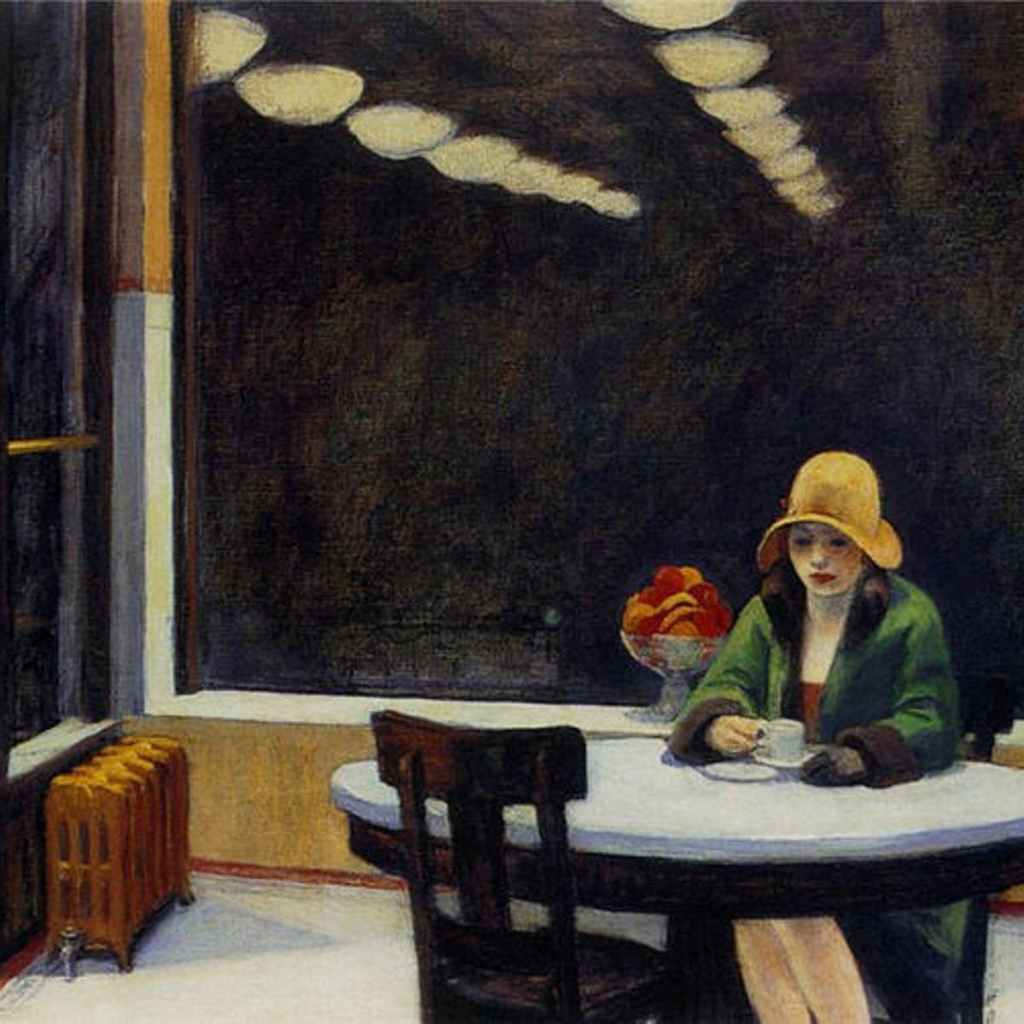



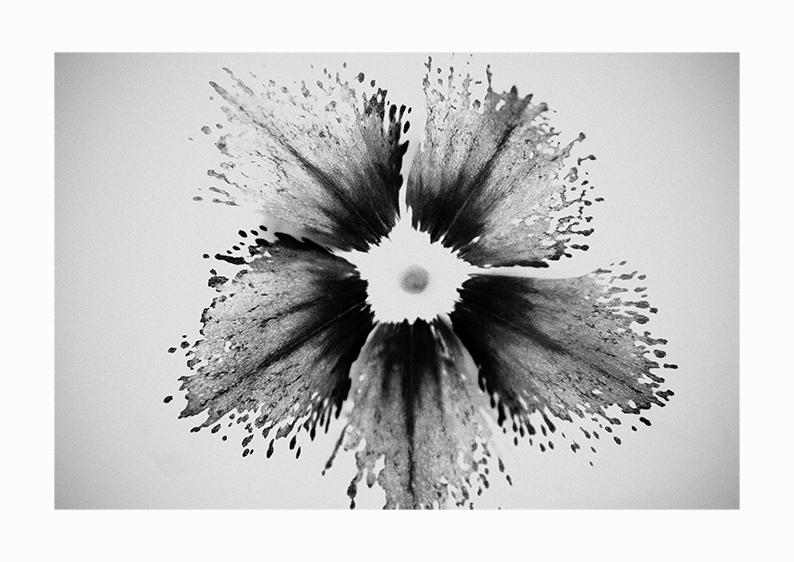
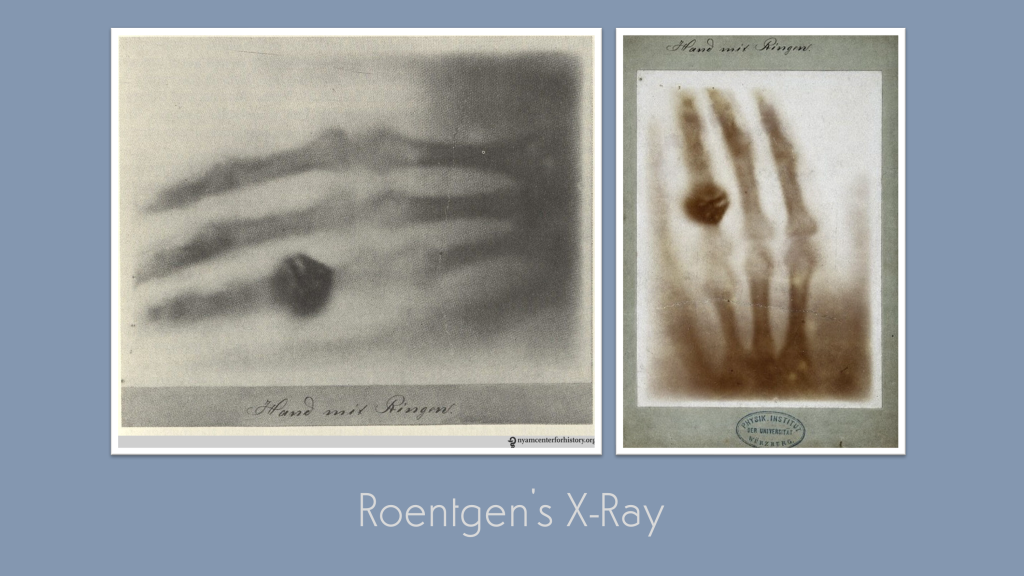
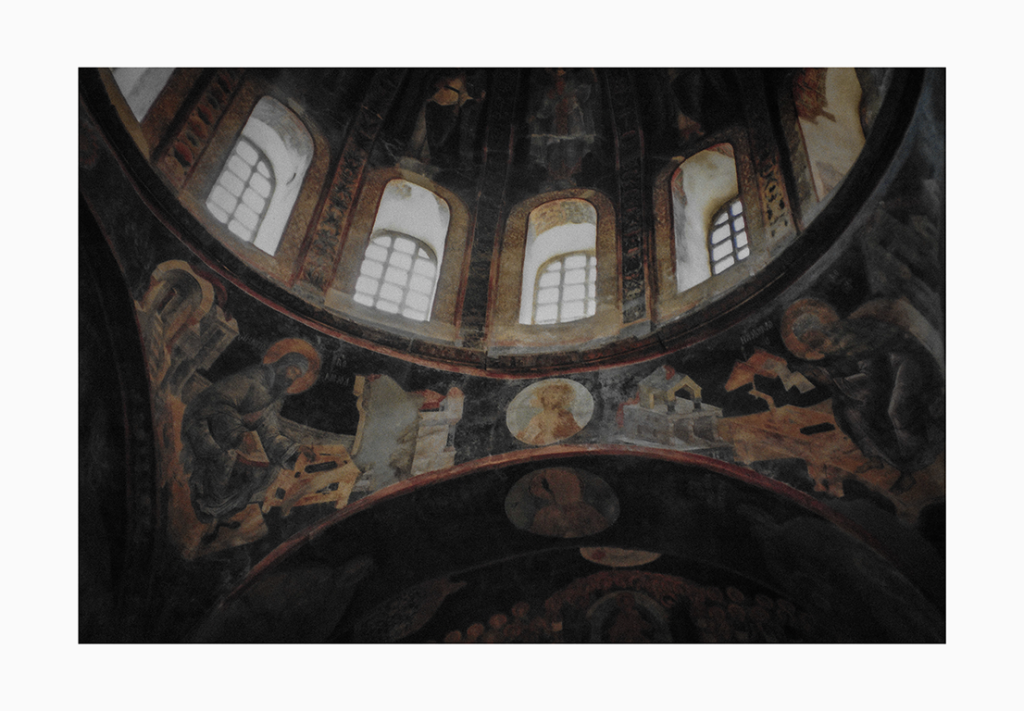
Leave a comment